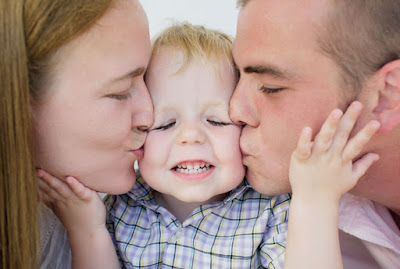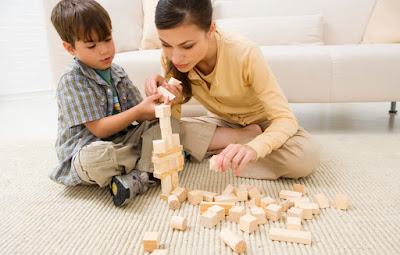Violence is not hereditary, it is learned. And unfortunately often is home to a model that does not benefit foster closer family ties effective, therefore, we share 10 principles of positive parenting and good treatment:
1. To provide appropriate care and guidance
1. To provide appropriate care and guidance
For a child to develop properly you need physical, emotional care, behavior patterns and rules that make them feel loved, safe and secure. The neglect of parental care is a manifestation of violence against children.
Negligence is a lack of parental responsibility that causes a failure to those needs for survival and is not temporary or permanent met by parents, caregivers or guardians. It comprises a poor surveillance, neglect, deprivation of food, failure of medical treatment, prevention education, among others.
2. Know, protect and dialogue with them
Read also Positive parenting and the influence of TV on children's behavior
Positive Parenting requires patience and effort of caregivers to the child, based on three principles: know, protect and dialogue. Know and understand the children, worry about how they feel, what they think and how they react according to their stage of development.
Similarly, we must offer security and stability so that children can trust, feel protected and guided in order to have a healthy communication that allows to have an open dialogue about their problems. The problems must be solved in a positive way: without resorting to physical punishment, yelling, threats or insults.
3. Having a bond is decisive
the emotional ties are invisible but intensely emotional created between the child or the child and their parents or caregivers, from the moment of birth ties. Define the relationship between the two and have a decisive influence on the development of children, in their personality and self-esteem. It's that bond that gives the boy or girl to safety.
4. Openly show affection
Boys and girls do not assume that they are loved, they need to see and feel it to feel secure. The hug is a way in which they can express feelings of love, gratitude, empathy, love, understanding, pain, etc., thus turns out to be a complete expression of our emotional state no matter what stage of development we refer you. Although affection is also manifested showing interest in what children think and feel, dedicating time.
Children, who are showing affection daily through a hug, show a clear sense of belonging allowing them to develop self-esteem and identity healthy. Plus they can more easily develop self-confidence and security, which will be able to establish stable, sound and reliable bonding.
5. It is necessary to set rules and limits to give security
the rules and limits are as necessary to the emotional, cognitive and social development as affection. The boy and the girl needs a predictable environment and know what to expect from him or her parent, gives them security. The rules must be clear, simple and stable, and serve to facilitate family life and social life. It needs to be accompanied by a coherent explanation that the child or the child can understand: not worth the "because I said so".
6. Children should participate in the decision-making process and feel responsible
if it involves the children in setting standards it is easier than understanding and acceptance. All family members are more motivated when it comes to meet the standards if they were spoken and agreed. They may well get more creative and to be perceived as fair decisions. The children develop good self-esteem, self-confidence and sense of responsibility.
7. They should be taught the consequences of their actions
When children violate a rule or have a tantrum, it's not because they're bad or want lives miserable. As often happens to us adults, the children have difficulty controlling their emotions and tolerate frustration.
When the rules and the child are not respected or she goes beyond the reaction to bans or orders (breaking things, sticking to other children, are thrown to the ground and partaken), penalties that serve to repair the damage caused can be applied or to understand that what he has done is wrong and should not do it again.
Sanctions must be proportionate and clear, and implemented quickly and firmly, but quiet and respectful. Sanctions need to be maintained, so they must be provided, be realistic and not last too long.
8. Child abuse is not suited for training
why? Because the child or the child learns that love and violence can go hand in hand, when someone bothers me and I'm stronger I exercise my power over another to impose my will.
Learn the immediacy of force is more useful to the option of dialogue and setting standards and limits. When a boy or a girl sticks or insults him for something he has done wrong is deeply wrong, helpless and rejected by their parents, these emotions do not allow you to reflect on why you are punished. Correction without violence, accompanied by a clear explanation, with examples, alternatives and commitments help the child or the child to internalize the rules and respect them responsibly.
9. Resolves conflicts without violence
Conflicts within intimate relationships can strengthen the bonds of this union if resolved peacefully. Solve problems without violence or physical or verbal aggression, calls for self-criticism, to explore our motivations and respect for others. Deploy tools it requires communication and negotiation, such as:
- Active listening. Trying to understand what the other has to say (though not share your point of view).
- Put yourself in the place of another: what do you feel? It is important to show empathy.
- Do not use aggressive attitudes as insults, accusations, blackmail or threats. MAXIMISING postures of people facing each other and create a very unfavorable climate.
- Negotiate outputs to the problem, yielding on some things and making commitments.
Mothers and fathers must face many daily situations and to react immediately, without thinking. Some situations can be sources of concern, such as education or health of the children and daughters. Naturally sometimes it feels overwhelmed, sad or frustrated, but we must avoid this state is generalized or extended in time.










No comments:
New comments are not allowed.